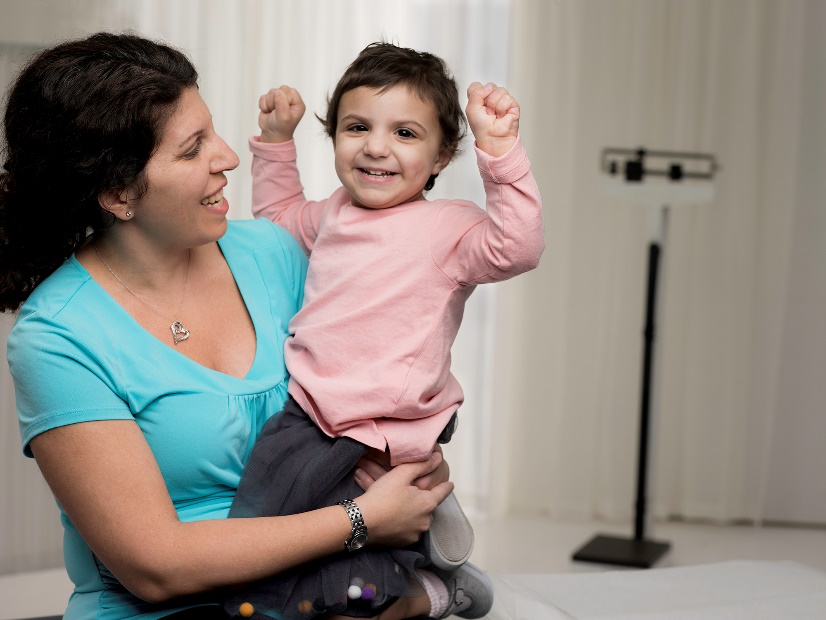After battling cancer for 19 months, 3-year-old Isabella Ieraci is getting to be a kid again.
She and her parents, Jennifer and Peter Ieraci of Floral Park, have gone to some birthday parties and to restaurants with her sisters, 11-year-old Sophia and 7-year-old Alexa, things they couldn’t do while she was being treated for neuroblastoma, a form of cancer that mostly affects children younger than 6.
The Ieracis have still worried about the cancer returning since the treatment wrapped up in January, they said. Isabella’s immune system is still weak, and she goes to the doctor for weekly checkups.
But Isabella is eager to press on, Peter Ieraci said, and she’s doing her part to raise awareness about childhood cancer by appearing in the St. Baldrick’s Foundation’s “Take Childhood Back From Cancer” campaign.
By sharing Isabella’s story, the Ieracis hope to give the public a better understanding of the toll cancer takes on a young child’s life, they said.
“There’s got to be a better way,” Peter Ieraci said. “What they put these kids through — I don’t even know if I could go through half of it and these kids just take it and they go and go.”
It was a visit to the eye doctor that led Isabella to be diagnosed with neuroblastoma in September 2013, her parents said.
She seemed healthy at the time, but the doctor found a problem with one of her optic nerves, Jennifer Ieraci said. That prompted more tests and scans, one of which revealed a tumor on her abdomen.
In all, Isabella spent more than 180 nights in hospitals and underwent two surgeries, two stem cell transplants, radiation therapy and six rounds of chemotherapy, Peter Ieraci said.
They even traveled to the Children’s Hospital of Philadelphia for MIBG therapy, a new form of radiation therapy that Isabella’s doctor, Dr. Jonathan Fish of Cohen Children’s Medical Center, has worked on, the Ieracis said.
The diagnosis was hard on Isabella’s sisters, who were not allowed in the part of the hospital where she was being treated, Jennifer Ieraci said.
But Isabella herself would always “bounce back” after each round of treatment, Peter Ieraci said.
“She was still very scared and just trying to get through things, but she was always tough,” he said.
Friends and neighbors in Floral Park supported the family by cooking meals, doing shopping and taking Sophia and Alexa to after-school activities and events, Jennifer Ieraci said.
But the intense treatment made it hard for the family to spend time together as they had before the diagnosis, the Ieracis said.
Isabella lived with a central line, tubes that were placed in her body so doctors could get chemotherapy and other medicine into her bloodstream easily. That meant the Ieracis had to be careful with how they picked her up, played with her and put her to bed, they said.
The treatments greatly weakened her immune system, meaning she could rarely go out with her family to meals or other activities, the Ieracis said. And her parents had to be extremely careful that she wouldn’t get sick when she did, they said.
“Right from the get-go, she lost her childhood,” Peter Ieraci said.
The St. Baldrick’s Foundation, the nation’s largest private funder of childhood cancer research grants, is using its first brand awareness campaign to show those effects of cancer on the lives of children.
The campaign includes photos and videos featuring Isabella and other children affected by cancer, and will eventually include educational items featuring Dr. Jeffrey Lipton, the foundation’s Scientific Advisory Committee chairman.
The Ieracis said they hope understanding more deeply what Isabella went through will lead people to support more funding for childhood cancer research, which only receives 4 percent of federal funding from the National Cancer Institute.
“Our national campaign to ‘Take Childhood Back From Cancer’ is raising awareness about childhood cancers in a way that focuses on restoring and preserving the carefree, innocent nature of childhood for children around the world,” Kathleen Ruddy, the foundation’s CEO, said in a news release.
St. Baldrick’s helps organize fundraising events where people shave their heads to show support for those undergoing cancer treatment, which often causes hair loss.
Sophia Ieraci’s classmates at Floral Park’s Our Lady of Victory School started a team called “Bella’s Brigade” for an event there last year, Peter Ieraci said.
They got 26 people to shave their heads and raised more than $30,000, he said. The event raised $270,000 overall.
One good thing that came from Isabella’s treatment was that she developed a knack for puzzles, the Ieracis said.
She also loves playing doctor, mimicking the procedures she dealt with, they said.
“She hopefully won’t remember a thing, but I can’t say that about us,” Peter Ieraci said.



